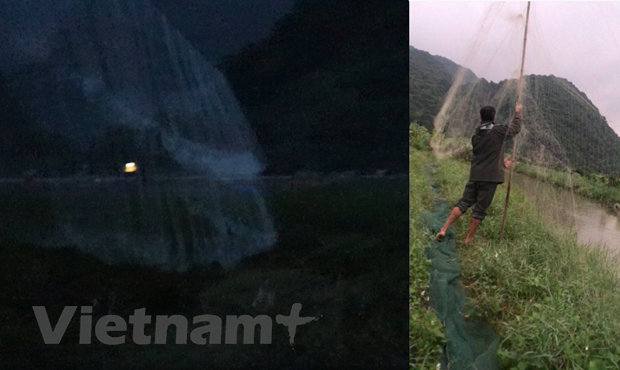 Environment
Environment


|
| Nets are stretched vertically at night to trap migratory birds around Cát Bà National Park in Cát Bà Island, Hải Phòng City. Photo Courtesy of Vietnamplus.vn |
HẢI PHÒNG — Local people have long been reportedly involved in illegal wild bird hunting and poaching in Cát Bà Island of the northern city of Hải Phòng and local authorities have failed to curb the problem for decades.
Now is the peak time for migratory birds to flock to the island which is home to both a national park and a Biosphere Reserve recognised by UNESCO in 2004. The island boasts great biodiversity with plenty of unique flora and fauna, including up to 160 species of birds.
However, it is difficult for visitors to see or hear the birds in nature. Meanwhile, Cát Bà wild birds’ tasty reputation has made wildlife businesses prosperous.
“If you want to buy a large number of wild birds, see Mr. Viễn. Those who usually hunt wild birds across island district of Cát Hải or around Cát Bà National Park sell the birds to Viễn,” a woman who owns a stall in Xuân Đám Commune market told reporters from vietnamplus.vn.
The reporters found Viễn’s house in Xuân Đám Commune where they were shown bags of newly-hunted birds that he had bought from hunters.
Pointing to two big fridges at his house, Viễn said that there were nearly 400 processed birds inside which would be delivered to his customers soon.
“We have both alive and frozen birds which will be transported to consumers by motorbikes, coaches and frozen trucks,” he said.
“Many birds here are banned for hunting and trade. Police and forest guards will catch you if you take the living birds off the island,” Viễn said.
He usually sells quốc (white-breasted waterhen) for VNĐ60,000, snipe for VNĐ 70,000, le le (lesser whistling duck) for VNĐ80,000 and wild pigeon for VNĐ190,000.
“I sell wild birds to local people and restaurants in Hải Phòng City and other areas including Ninh Bình, Vinh or Đà Nẵng,” Viễn said.
Hunting nets everywhere
Xuân Mã Commune located in the buffer area of Cát Bà National Park is popular among local bird hunters. They use loudspeakers and play bird sound to lure birds to areas with nets to trap them.
Normally, a hunting net is about 100-200m wide and 3-4m high. With bamboo sticks, nets are stretched vertically across fields, along forest and coasts in the nighttime.
Hearing the loud bird sound, migratory birds rush to the nets and are trapped there.
A local man named Thuấn said that he was using more than 30 nets to catch wild birds.
An “invisible” net with the length of 100m cost VNĐ1.2 million and can be used for two years, Thuấn said, adding that he could earn on average VNĐ1 million per working night and hundreds of millions of Vietnamese đồng during the whole bird migration season which usually lasts about three months starting from September.
Thuấn also said that to work as a wild bird hunter, it was a must to have “good relationship” with forest rangers who would inform him prior to any inspection so that he could remove the nets.
Thuấn said that due to the profits that bird hunting can generate, many local people were engaged in the business.
“In my village, nearly 40 households earn their living from bird hunting,” Thuấn said, adding that in the past, every household in the village did such work and they all knew which birds were banned for hunting but they still hunted the birds.
Nguyễn Quang Thành, head of Cát Hải- Bạch Long Vĩ Forest Protection Division, said wild bird hunting and poaching had been reported since the 2000s but few violators were detected and punished.
Often, as soon as the illegal hunting/poaching was reported, authorities carried out inspections but found no violators but just a few exhibits.
It was assumed that information about authorities’ inspections was leaked, Thành said, adding that it was difficult to tackle the illegal bird hunting and trade as the birds were not sold in public.
Hoàng Thị Thanh Nhàn, vice director of Natural Conservation and Biodiversity Department under the Ministry of Natural Resources and Environment, said that migratory birds were an important part of the ecosystem, supporting the growth of plants and controlling harmful pests.
“The illegal hunting of migratory birds at Cát Bà will directly affect biodiversity, ecosystem balance and sustainable development of the Cát Bà Biosphere Reserve,” she said.
Việt Nam has a legal framework to protect wildlife, Hà said, adding that law enforcement in Cát Bà was poor as the illegal bird hunting had happened for years.
Nguyễn Đức Tú from the International Union for Conservation of Nature said using nets and bird sound to lure and catch migratory birds had long been reported, posing threats to biodiversity and disease transmission from animals to human.
Bùi Thị Hà, vice director of Education for Nature Vietnam, said that to curb and prevent illegal hunting, a combination of measures were needed including better communication, increased public understanding and improved legal framework and better law enforcement.
“Asking people not to hunt wild birds and remove trapping nets are not enough. Strict punishment for violators is needed. People must be shown which legal penalties they would face if they are involved in illegal wild bird hunting and trading,” Hà said. VNS




